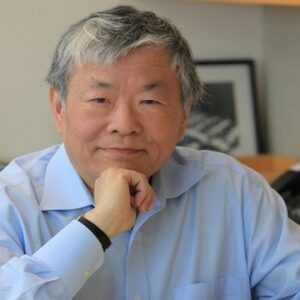Susumu Tonegawa is a molecular scientist from Japan who received the Nobel Prize in Physiology or Medicine in 1987. His work explained the adaptive immune system’s genetic mechanism by discovering the genetic mechanism that causes antibody diversity. He began his career as a molecular biologist, then moved on to immunology research before returning to neurology. He grew up in rural towns, enjoying the spaciousness and freedom of the countryside, as the son of an engineer from Nagoya. He was moved to a Tokyo high school, where he became interested in science. After reading works by François Jacob and Jacques Monod at Kyoto University, he became attracted with operon theory. He subsequently came to the United States to earn his doctorate at the University of California. He then moved to Switzerland’s Basel Institute for Immunology, where he did groundbreaking immunology research and found the genetic mechanism that causes antibody diversity. He received several significant accolades for this seminal discovery, including the Louisa Gross Horwitz Prize and the Nobel Prize in Physiology or Medicine. In his later years, he focused on neuroscience research, exploring the molecular, cellular, and neural underpinnings of memory development and retrieval.
Childhood and Adolescence
Susumu Tonegawa was born on September 6, 1939, in Nagoya, Japan, to a family of four children. His father worked in the textile industry as an engineer, and his position compelled him to relocate the family every few years. The youngsters enjoyed a wonderful childhood growing up in several tiny towns throughout the countryside.
His parents insisted that their children receive a proper education. He graduated from Tokyo’s famous Hibiya High School and enrolled at Kyoto University in 1959. He became interested in molecular biology, notably operon theory, after reading works by renowned biologists François Jacob and Jacques Monod during his academic days.
He traveled to the United States after graduating from Kyoto University in 1963 because the study of molecular biology in Japan was limited. He began his doctoral studies at the University of California, San Diego (UCSD) with Dr. Masaki Hayashi. His thesis effort on the transcriptional regulation of phage lambda earned him his Ph.D. in 1968.
Susumu Tonegawa’s Career
He worked as a postdoctoral scholar in Professor Hayashi’s laboratory studying the morphogenesis of phages after finishing his degree in 1969. He subsequently continued his postdoctoral research at the Salk Institute in San Diego in Renato Dulbecco’s lab.
Tonegawa was persuaded by Dulbecco to relocate to Switzerland, and in 1971 he joined the Basel Institute for Immunology in Basel. He switched from molecular biology to immunology research here.
He did substantial immunological research in the 1970s. He demonstrated that genetic material rearranges itself to generate millions of antibodies by applying recently developed recombinant DNA techniques to immunology.
He returned to the United States in 1981 to work as a biology professor at the Massachusetts Institute of Technology’s Center for Cancer Research (MIT). Continuing his research, he found the first cellular enhancer element, a transcriptional enhancer element associated with the antibody gene complex.
He became interested in neurology in the 1990s. In mammalian systems, he and his team pioneered introductory transgenic and gene-knockout methods. He discovered the CaMKII enzyme in 1992 and the NMDA receptor synaptic protein in 1996, both of which are important in memory formation.
He was named the inaugural Director of the MIT Center for Learning and Memory in 1994. (now the Picower Center for Learning and Memory). He left his position as director in 2006 and is now a Picower Professor of Neuroscience and Biology.
He pioneered the use of optogenetics and biotechnology in neuroscience research, resulting in the identification and manipulation of memory engram cells. He also contributed significantly to our understanding of the hippocampus’s involvement in memory development and recall.
He is still involved in research, having recently discovered the importance of memory engram cell ensembles in memory valence, as well as their role in brain illnesses like depression, amnesia, and Alzheimer’s disease.
Susumu’s Major Projects
Susumu Tonegawa’s work on antibody diversity has earned him international renown. In the 1970s, he discovered the answer to an immunological puzzle that had perplexed scientists for years: how antibody diversity is developed through a series of studies. He proved that genetic material can rearrange itself to generate the wide spectrum of antibodies available.
Achievements and Awards
Susumu Tonegawa received the Louisa Gross Horwitz Prize for Biology or Biochemistry in 1982.
He won the Nobel Prize in Physiology or Medicine in 1987 “for his discovery of the genetic principle underlying antibody diversity creation.”
In 2010, UCSD presented him with the David M. Bonner Lifetime Achievement Award.
Personal History and Legacy
Susumu Tonegawa has been married twice. His first marriage ended in divorce with Kyoko. He married Mayumi Yoshinari, a former NHK (Japan Broadcasting Corporation) director/interviewer who is currently a freelance science writer, for the second time. They have three children together.
Estimated Net Worth
Susumu Tonegawa’s net worth is believed to be $3 million, with primary sources of income including scientists, molecular biologists, neuroscientists, immunologists, chemists, physicians, geneticists, and professors. We don’t have enough information about Susumu Tonegawa’s cars or lifestyle.


